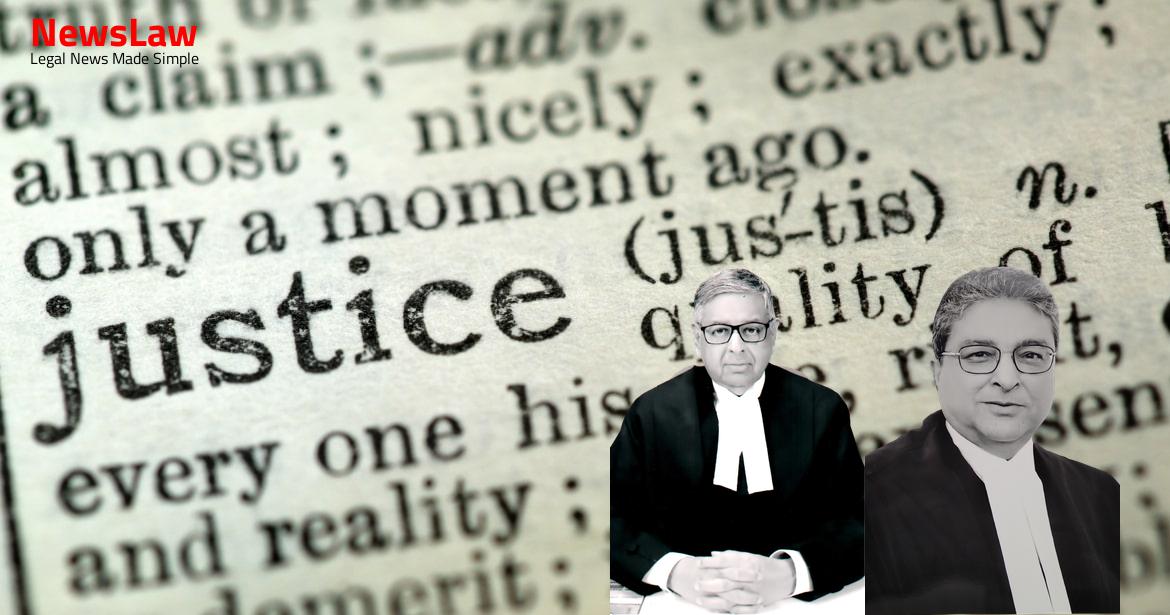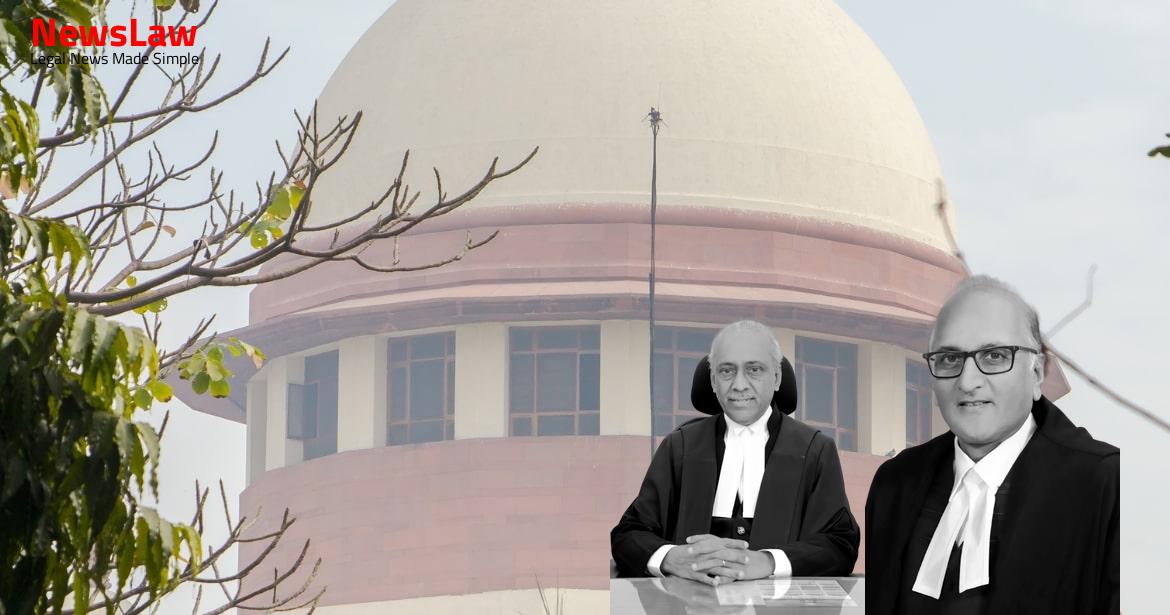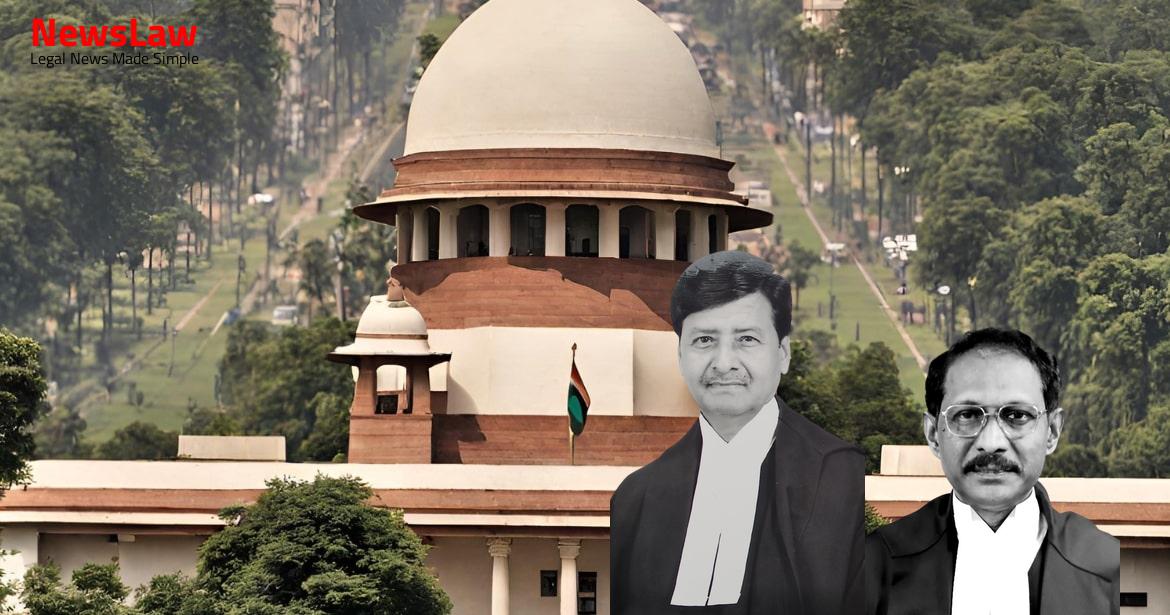Explore a detailed legal analysis by the court on the validity of challenging a compromise decree in a recent case. The court’s assessment of the Civil Procedure Code amendments and the implications for disputing compromise decrees sheds light on the complexities of legal proceedings in such matters. Stay tuned to unravel the nuances of the court’s insightful legal analysis.
Facts
- The plaintiff, in this case, is claiming right, title, and interest in the suit property based on a sale deed executed much before the compromise decree.
- The plaintiff’s contention is that the compromise decree was obtained fraudulently and collusively, affecting his rights over the subject property.
- The High Court’s dismissal of the appeal at the motion stage was contested on grounds of preventing the plaintiff from questioning the compromise decree.
- The plaintiff purchased the suit property from Sampatiya and was put in possession, but faced interference due to the compromise decree between Sampatiya and Salehari.
- Allegations were made regarding the fraud and misrepresentation in obtaining the compromise decree, concealing the existence of the prior sale deed.
- The respondents-defendants disputed the suit’s maintainability by claiming Salehari, as the daughter of Kunjan Singh, to be the rightful heir.
- The plaintiff’s possession over the property and the validity of the compromise decree were central points of contention in the proceedings.
Also Read: Interpretation of ‘Distinct Category’ in Service Association Recognition Rules
Issue
- The trial judge framed 9 issues based on the pleadings of the parties.
- The first issue was whether the plaintiff had a valid cause of action.
- The second issue pertained to the maintainability of the suit as framed.
Also Read: Rights Violation in Relegation Order
Arguments
- The respondents’ counsel argues that the compromise decree executed between the parties should not be questioned, even by a stranger to the proceedings.
- The suit filed by the appellant-plaintiff sought a declaration that the compromise decree be declared illegal, obtained through fraud and misrepresentation.
- The respondents’ counsel contends that the civil court cannot adjudicate on the legality of the compromise decree due to the bar under Order 23 Rule 3A of the CPC.
- While the appellant-plaintiff could have filed a suit to protect their own rights, questioning the compromise decree in this manner is not permissible.
- Support is given to the findings of the High Court in this regard.
Also Read: Legal Case: Sentence Reduction in Non-Compoundable Offence
Analysis
- The amendment to the Civil Procedure Code(Amendment) 1976 introduced Rule 3A to Order 23 which bars suits to set aside a decree based on an unlawful compromise.
- Finality of decisions is crucial, and the creation of further litigation should not be the basis of compromise.
- Order 23 Rule 3 CPC aims to avoid multiple litigations and allows for lawful settlements in writing by the parties.
- The court can assist in reaching a valid compromise, ensuring finality to the agreement.
- After the amendment, no appeal can be made against an order recording or refusing to record a compromise under Rule 3 of Order 23.
- A new Rule 1A in Order 43 allows parties to challenge non-appealable orders in appeal against the decree, specifically in cases governed by Rule 3A of Order 23 CPC.
- A consent decree is essentially a contract between parties endorsed by the court.
- The court has the authority to determine the lawfulness of an agreement or compromise in writing signed by the parties.
- If a party denies a compromise and appeals the decree, Section 96(3) CPC does not bar the appeal if the factum of compromise is in dispute.
- The court must decide the legality of the agreement or compromise based on the provisions of the Contract Act, 1872.
- No appeal is maintainable against a consent decree due to the specific bar in Section 96(3) CPC.
- No appeal is maintainable against the court’s order recording or refusing to record a compromise.
- No independent suit can be filed to set aside a compromise decree based on the ground that the compromise was not lawful, as per Rule 3-A of Order 23.
- The appellant was not a party to the compromise decree passed by the High Court in the partition suit.
- The appellant can only claim through his predecessor, Sampatiya, to the extent of rights and remedies available to Sampatiya in reference to the compromise decree.
- The appellant cannot question the validity of the compromise decree passed by the High Court in a substantive suit before the civil Court.
- The trial Court is not competent to adjudicate the grievance of the appellant regarding the validity of the compromise decree.
- The suit instituted by the appellant before the civil Court was not maintainable due to the specific bar under Rule 3A of Order 23 CPC.
Decision
- The suit was instituted in 1995 and 25 years have passed.
- The trial judge found against the appellant regarding the right, title, and interest of the suit property based on a sale deed from 6 January 1984.
- The Court of Appeal did not interfere with this finding.
- The matter is being remitted back to the trial court to reexamine the suit filed by the appellant independently.
- The sale deed from 6 January 1984 may not serve its purpose in the changed circumstances.
- The appeal is dismissed as it lacks substance.
- No costs are awarded.
- Pending applications are disposed of.
Case Title: TRILOKI NATH SINGH Vs. ANIRUDH SINGH (D) THR. LRS . (2020 INSC 385)
Case Number: C.A. No.-003961-003961 / 2010



